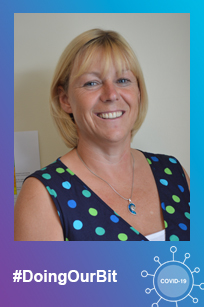FSD volunteers in action (#DoingOurBit)
Stuart Wayment (pictured) knows his way around a spreadsheet. With 30 years’ experience as an accountant, this perhaps comes with the territory. But during Covid-19 response, he has been putting these skills to good use supporting a local charity to help coordinate local volunteers to support vulnerable households and those in isolation.
Mr Wayment, has been finance skills development (FSD) manager on the south east coast for the last 10 years, splitting his time between supporting the local Skills Development Network and the HFMA Kent Surrey and Sussex Branch. Between the two roles he organises and supports close to 50 events a year supporting the 1,200 finance staff across the area’s 30+ organisations.
That programme remains very much up and running although classroom and conference style events are rapidly being rescheduled to take place virtually. However, as the Covid-19 pandemic hit the UK, he was approached to provide support to a local charity, which has backing from the local council and Chamber of Commerce.
The charity – Ferndown Community Coronavirus Support (FCCS) – has been recruiting volunteers to help support those in the local community who are shielding at home because of their potential vulnerability to the virus or self-isolating and unable to leave their house.
‘Basically I was asked if I could help coordinate the volunteers and match them with those in need of support,’ says Mr Wayment. ‘The charity provides basic help with shopping, collecting prescriptions and maybe even dog walking for locals who register on its website, many of whom are elderly or vulnerable. It also offers a friendly phone call and this is something that can be delivered by volunteers who are themselves self-isolating. That can be good for the mental wellbeing of both parties.’
Mr Wayment manages the process of matching volunteers with those who have requested help and is also on the volunteer list himself. With around 250 volunteers and a similar number of people being supported, it involves a big spreadsheet and a lot of time talking to both the volunteers and residents. He says it was a time-consuming process in the first few weeks – taking between four and five hours of his spare time on the busiest days.
The time commitment has eased off a little as arrangements hit a steady state, but activity has picked up again recently as some volunteers are returning to work from furlough arrangements and are having to step back from their voluntary commitment.
The service has also co-ordinated some treat nights including delivering fish and chips to 70 houses a couple of weeks ago – an event that went down so well it has been repeated on subsequent Wednesdays. All payments are made electronically to avoid the exchange of cash and to ensure volunteers get reimbursed rapidly.
‘This appealed to me because my own parents live 300 miles away and are shielding,’ says Mr Wayment. ‘I can’t support them directly on a daily basis, but I can help out locally and hope that my parents are getting similar support in their area.’
In the North West, Skills Development Network co-ordinator Sara Braidwood (pictured) has also been volunteering to do her bit in supporting the NHS response to the pandemic. She is used to looking after people as she coordinates support for finance students and apprentices across the region. But she has recently been providing support on the frontline to relieve pressure on hard pressed staff.
Ms Braidwood splits her time between the North West Skills Development Network and the HFMA North West Branch and is hosted by Warrington and Halton Teaching Hospitals NHS Foundation Trust.
The trust has an on-going programme called Helping Hands, whereby non-patient facing staff can help out on wards during high pressure times. With specific pressures facing all hospitals with the onset of Covid-19, the trust was looking to expand its volunteer pool and Ms Braidwood and her colleague Helen Pennington were keen to sign-up.
‘I do lots of charity things outside work, but this was different and I wanted to do something specifically to help with the trust’s response to the virus,’ she says.
All the events run as part of the student support programme have switched to online webinars as a result of the outbreak – and if anything the support being provided to students has increased. ‘We’ve got about 280 students across the region and about 80 apprentices,’ she says. ‘Many of the latter are level three and school leaving age and now they are mostly working from home, which is very new to them. So, we are staying in touch and helping where we can.’
Across the student body in general, many are preparing for exams. While AAT exams have been put on hold, CIMA , ACCA and CIPFA have simply moved theirs online – so it remains an important time for accountancy students.
Despite remaining busy at work, Ms Braidwood says the Helping Hands initiative allows her to help when she can. For example, she spent a week helping the nursing team on the dementia ward, by working a short late afternoon/early evening shift.
‘It was mostly just talking to patients – because of the restrictions related to the virus, they aren’t allowed visitors and using tablets or smart phones is not possible for many of them. So, it was just a case of providing a bit of company – perhaps doing some drawing with them. But a major part of it was supporting the staff by helping at meal times and serving drinks.’
The trust provides the volunteers with training – with a particular focus at the moment on what personal protective equipment is needed for the different roles, although she admits that wearing a mask made communication much more difficult.
Overall Ms Braidwood says the experience is really positive – doing something useful and getting a reminder of the reason she is working in the NHS. ‘It is all about patient care – that’s what we tell our finance students – and it’s good to remind yourself of that in a direct way,’ she says.
Related content
We are excited to bring you a fun packed Eastern Branch Conference in 2025 over three days.
This event is for those that will benefit from an overview of costing in the NHS or those new to costing and will cover why we cost and the processes.